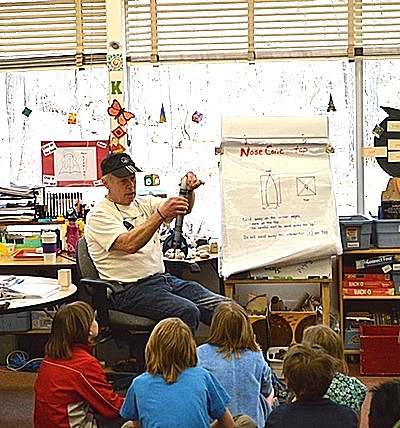- By Heather Zimar
- Around Town
 Print
Print  For many years, teacher Steve Ryan taught third-graders at Cayuga Heights Elementary School (CHES) the art of rocket-making. After his retirement three years ago, the program was discontinued, except for an afterschool enrichment class that served only a few students. This year, with the help of Ithaca Public Education Initiative (IPEI) Red and Gold Grants, the rocket program is back.
For many years, teacher Steve Ryan taught third-graders at Cayuga Heights Elementary School (CHES) the art of rocket-making. After his retirement three years ago, the program was discontinued, except for an afterschool enrichment class that served only a few students. This year, with the help of Ithaca Public Education Initiative (IPEI) Red and Gold Grants, the rocket program is back.“We saw the enrichment program happening, and we decided we should bring it back into the school day,” said Spencer Hill, one of three third-grade teachers who received a Red and Gold Grant to fund the program at CHES. Red and Gold Grants are awards for one-time projects that strengthen and enrich Ithaca schools. May 6 is the next deadline for Red and Gold Grant application submissions, and the awards of up to $500 are announced within two weeks.
“I’ve heard fifth-graders say making rockets was their favorite memory from elementary school,” said Emily Graber, one of the third-grade teachers. “That was a big motivator in re-establishing the program.”
“I love the fact that rockets are returning to CHES,” said Principal Brad Pollack. “I am delighted that building and launching rockets is being offered in third grade to all of our students. Rocket launching is a great way to enhance math and science skills, in a very real, hands-on, tangible way. In addition, students have the opportunity to experience the joys of invention, creation, experimentation, and discovery.”

This spring, as part of the IPEI grant, Ryan has been visiting CHES as a community partner and teaching nearly 50 third-graders how to build rockets from scratch using balsa wood, cardboard tubes, string, and plastic bags. Students are learning how to use tools such as rasps, saws, and sandpaper to measure materials and shape the wood. The classes will launch their completed rockets later this spring. “There’s a lot of listening and cooperating that goes into it,” Ryan said. “When the students are done, there’s a real sense of accomplishment. There’s a lot of connection to standards, and on top of that, it’s really fun.”
As they sanded and filed, many of the third-graders looked ahead to what paint colors they’ll choose and whether their rocket will land safely after launched. Ana Duke said, “I like the part where we know we’ll shoot them out and we might get them back. And all the hard effort is for something fun.”
Hannah Kraus said: “I really like sanding. I also like sawing. I want to spray-paint the body yellow, my nose cone orange, and the fins red and green. I can’t wait until we shoot the rockets up. I want to see the parachute come down.”
“I like the tools we use and knowing that after all the effort, at the end, we get to see something that we made,” said Rosa Whittaker.
Adam Saar said: “It’s really fun, and we get to do it all by ourselves. So far, I’ve really enjoyed the sawing and cutting the discs. They’re fun, and they take quite a lot of effort.” Nicholas Danforth added, “I like to see stuff going up in the air, and I like making stuff. I’m trying to make it as good as I can.”
“I love how excited the kids get about it,” said Graber. “This is fun and educational. They’re learning about math and science. They’re rocket scientists, and they’re working as a team. It’s a blast.”
Third-grade teacher Kim Snow said: “There are so many skills involved, from cooperating and listening to each other to understanding circumference. To be only eight or nine years old and get to launch a rocket is the coolest thing ever.”
Both Snow and Graber noted that students at all skill levels benefit from this project. “Even someone who is struggling academically can shine in this area,” Snow said. Graber added, “I love how my kids who are academically challenged in other areas can feel successful; they are don’t always have those opportunities.”
Hill noted that the students are learning that the care and attention they put into the project has an impact on its outcome. “It’s their rocket. They’ll see it does make a difference how much effort they put in. It’s a lot of accuracy and measurement, physics, science and math. It’s a great combination of skills.”
Ryan not only is teaching the students rocket-building skills, he’s mentoring the teachers to continue the program in the future. “He’s teaching us how to do it so we’ll be able to run it next year successfully on our own,” Graber said. “I’m thrilled we were accepted and received the IPEI grant.”
“I am grateful to IPEI to help make rocket-launching a reality at CHES this year,” Pollack added. “And since the goal is to have this be a sustainable project by reusing and recycling as many of the parts of the rockets as possible, my hopes are that rocket-launching will become a permanent part of the third-grade experience. I’m thankful to IPEI, for helping our young minds soar.”
v9i16



